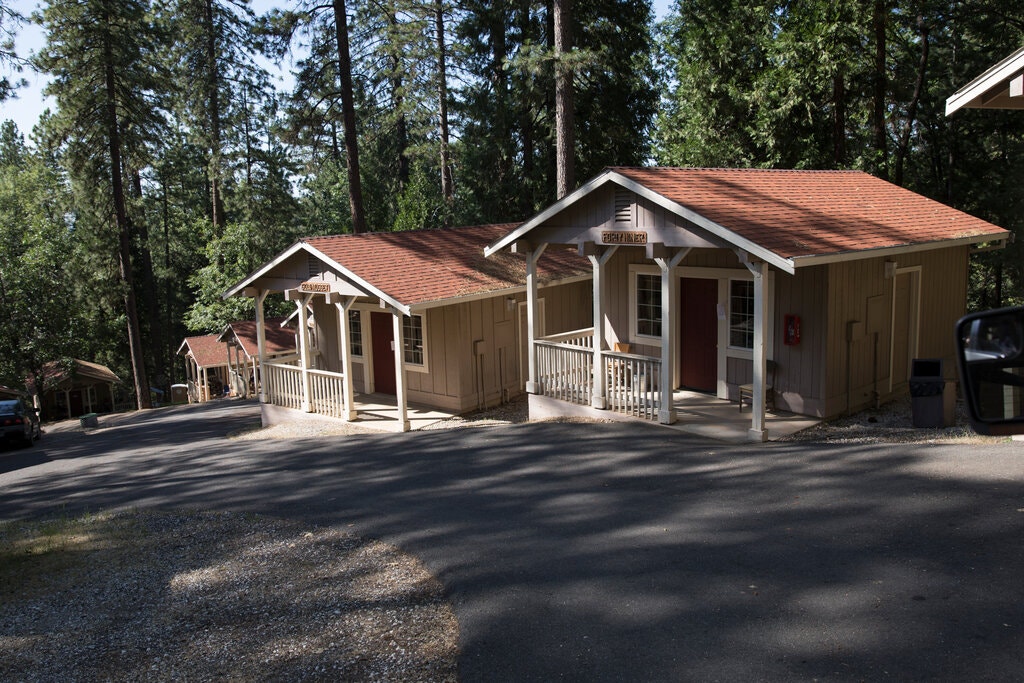An Update on Project Roomkey in Tuolumne County

Old Oak Ranch, where people experiencing homelessness were housed as part of Project Roomkey. Photo: Meiying Wu
A pandemic program publicized by the state faced challenges in implementation.
By Tessa Paoli and
Sept. 21, 2020
Anita Nadolsky, 59, thought she had finally caught some luck.
In May she became one of several dozen homeless people in Tuolumne County to get shelter through Project Roomkey, a much-publicized California program intended to move medically vulnerable people out of homeless camps and shelters and off the streets as a way to reduce the spread of Covid-19.
Ms. Nadolsky moved into a room at the Old Oak Ranch, a 170-acre summer camp in the Sierra foothills. She had been living out of her van the last few years, and a robbery at gunpoint last winter left her so nervous she stayed up until dawn most nights to guard against more attacks. Her arrival at the ranch, she said, was the first time in months she’d slept through the night. She stayed in one of the camp’s large rooms — what she called the “V.I.P. room” — and had meals delivered to her door.
“My first night I was in shock and awe,” she said. “I felt safe for a change.”
Yet just six weeks after she’d settled into her new room, she had to move out. “They told me I had to be out of there by 6 o’clock,” she said. “They just threw everything in my van. I was treated like a bag of trash again.”
Project Roomkey has been championed by Gov. Gavin Newsom as an important defense against the coronavirus, as well as a step toward reducing homelessness. The state promised $150 million and FEMA pledged to reimburse local governments for most expenses related to the program. By early September, the state reported, nearly 22,000 people had been placed in temporary rooms all across California.
But in Tuolumne County, which is just north of Yosemite, the early success of Project Roomkey was followed by an abrupt, chaotic unraveling that exposed an already fragile group of people to increased health risks.
The stability Old Oak Ranch provided to several dozen people, including Ms. Nadolsky, vanished in a matter of hours just as a resurgence in coronavirus infections swept through California in June.
Ms. Nadolsky has a rare neurological condition called dystonia, which has caused her three strokes and worsens when she is under stress. The day she was pushed to leave the ranch, she sat on the side of the road for hours, wondering where she would sleep that night while experiencing a painful dystonic episode.
Project Roomkey was never intended to be permanent. The state rolled the program out quickly and counties raced to spend the newly available money. Kellae Brown, homelessness prevention coordinator of Tuolumne County, said state officials didn’t always have guidance when questions came up at the beginning.
“There were literally no answers to give,” she said in late June.
The Amador Tuolumne Community Action Agency helped administer the funding for Project Roomkey in Tuolumne and three other counties in Northern California. Denise Cloward, the agency’s housing director, said one of the main problems was insufficient funding that had to be spent quickly.
Tuolumne County received $170,000 and signed a five-week contract with Old Oak Ranch, a camp owned by International Church of the Foursquare Gospel, a Pentecostal organization based in Los Angeles. In late May, the county extended the contract through the end of June.
At first the arrangement worked well. Ms. Brown said she would go to encampments to try to track down people who needed shelter and bring them to Old Oak Ranch.
The couple running the ranch, Chris and Christine Khan, ate meals with their new tenants, provided informal counseling, and helped many of the residents stop using drugs and alcohol.
Ms. Brown and the Khans were not aware of any positive coronavirus cases. By late June, with money from the county running out, the Khans offered to let tenants stay for July if they could come up with $500 rent, and some tenants said they were told they would be able to stay at Old Oak Ranch through the end of the year.
“We were under the impression that the county project was up and that they would be leaving,” Chris White, a church official, said.
The church offered the tenants a choice: They could stay at the camp with no meals or services, or they could leave that day with a “gift” from the church of up to $2,500 to help them relocate.
All 25 tenants who were living at the ranch the day it shut down took the money. The week before Old Oak Ranch was shut down, Tuolumne County’s Covid-19 case count had doubled, rising to 22 cases from 11 cases. By mid-September, there were 200 cases, and four deaths.
At least two people sheltering at the ranch tested positive for the coronavirus after the camp closed.
One was Luana Cooley, 61, who was so ill by the end of July that she could no longer stand up on her own. She went to the hospital on July 31, where doctors found she had suffered a heart attack “probably related to the stress of being infected with Covid-19,” her discharge papers said.
After staying one night in the hospital, she headed to a Staples parking lot in Sonora to sleep outside and social distance as much as she could. Since August, she has bounced between that parking lot and a nearby motel, when she collects enough money panhandling to afford it.
“The homeless are forgotten,” Ms. Cooley said.
State and county officials declined to discuss the chaotic closure of Old Oak Ranch.
In June, Mr. Newsom announced a new plan, called Project Homekey, which he said would build on the goals of Project Roomkey by using $600 million in federal and state funds to acquire and rehabilitate vacant apartment buildings, motels and other shelter spaces to create permanent solutions for the unhoused. Last week, he announced the first set of awards: $76.5 million distributed among seven California communities.
But the stability Project Homekey promises remains a long way off for Ms. Nadolsky. Tuolumne County has not received Project Homekey funding. The county and several nonprofit organizations have helped to pay for hotel rooms for many of the people displaced after Old Oak Ranch closed, including Ms. Nadolsky. They have since found housing for some. But by August, Ms. Nadolsky was back where she was before Old Oak Ranch.
“I thought I mattered to people, that my life mattered, that they cared,” she said.
Finally, in early September, she found a monthly rental on her own that she can barely afford. She is relieved to have a place to call home again, but still struggles to feel at ease, troubled by the memory of the abrupt shutdown of Old Oak Ranch.
“I still have nightmares,” Ms. Nadolsky said.



